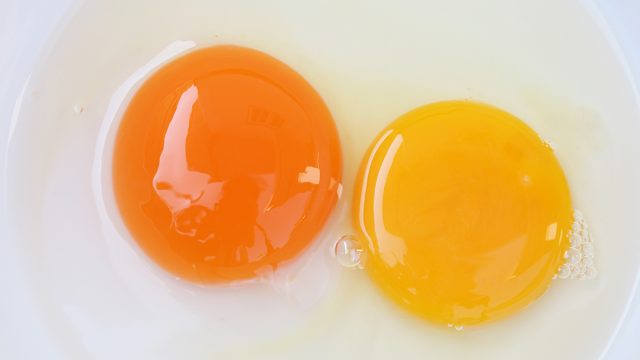What Does the Color of an Egg Yolk Mean
The Surprising Reason the Color Of Egg Yolks Matter
The color can actually tell you a lot!

August 10, 2020

I tend to be cheap with my grocery shopping week-after-week. But if I find a great deal on quality products—like cage-free eggs—I always take advantage of it. This week I came home with a cage-free 18-count carton and immediately made some scrambled eggs when I got home. When I cracked open the egg, the yolk was orange. At first, it felt off-putting. But after a bit of research, I soon found out that having an orange yolk is actually better for my health. Surprisingly, the color of egg yolks actually does matter.
According to a study published by the Journal of Food Science, egg yolks that have a darker color (such as a mustard yellow or a light orange) typically contain even more omega-3s and vitamins compared to an average lighter yolk egg. The difference in the two different eggs is actually based on the diet and health of the chicken who laid them.
In order to better understand the subject, I spoke with two different registered dietitians about egg yolks to find out if it's really healthier to eat darker egg yolks, and what consumers should know.
Why egg yolks can be different colors
"The color of the yolk can actually tell you a great deal about the nutritional content of the egg," says Vanessa Rissetto MS, RD, CDN and co-founder of Culina Health. "In general, you want your yolk to be a dark and vibrant orange color. These yolks are typically produced by pasture-raised hens whose diets consist of fresh grass, worms, and grasshoppers. This diet is rich in carotenoids, which gives the yolks the rich orange color."
"Some studies show that darker and more colorful egg yolks, especially from pasture-raised hens, can have more omega-3s and vitamins due to the more natural feed the chickens eat," says Rachel Paul, PhD, RD from CollegeNutritionist.com. Studies also show that incorporating chia seeds into the hen's diet will also result in a darker yolk.
Rissetto also points out that the color of the yolks can actually taste different! She points out that some chefs even say the deeper colored yolks (like the orange yolks) will likely have the "more vibrant flavor" compared to lighter ones.
However, while some chickens are feasting on a good diet, others don't get as much of a robust feed, which does result in a lighter yolk.
"If the yolk is light yellow, those hens were likely fed a vegetarian diet consisting of corn and wheat," says Rissetto.
Even though the darker yolks do provide rich nutrients for the consumers, that does not mean the nutritional value of the egg changes at all. In fact, according to Paul, the yolk will still provide the same amount of protein and fat, no matter the color.
"While the nutritional value of the egg does not change significantly based on the color of the yolk, it is a great indicator of the health of the mother hen," says Rissetto.
So even if the protein and fat content remain the same no matter the egg type, if you find yourself cracking open an egg with an orange yolk, get ready for an extra boost of nutrients in your diet!
For even more healthy eating tips, be sure to sign up for our newsletter.
Kiersten Hickman
Kiersten Hickman is a senior editor at Eat This, Not That!, with a main focus on food coverage, nutrition, and recipe development. Read more
What Does the Color of an Egg Yolk Mean
Source: https://www.eatthis.com/color-egg-yolks/